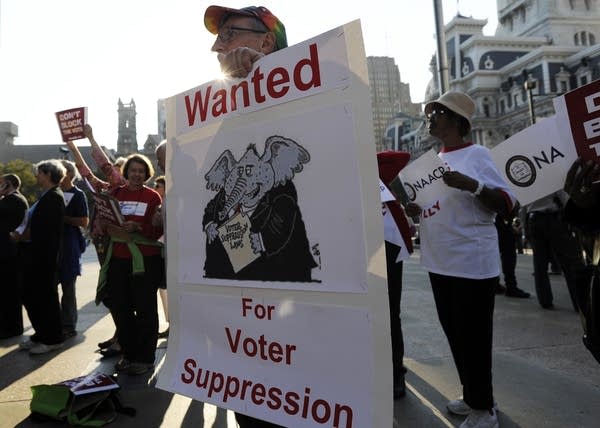Pa. voter ID issue is far from resolved
Go Deeper.
Create an account or log in to save stories.
Like this?
Thanks for liking this story! We have added it to a list of your favorite stories.

By MARC LEVY
Associated Press
HARRISBURG, Pa. (AP) — Just because opponents of Pennsylvania's new law requiring voter to show photo identification law won a preliminary injunction in court doesn't mean the issue or the court case is going away.
The law itself has not cleared the constitutional challenges before it, and indications from the state Supreme Court are that the law still faces significant legal problems.
Meanwhile, the hubbub over the divisive law has awakened new Democratic Party volunteers and prompted the formation of the 175-group Voter ID Coalition. The Democratic Party and the coalition both said Wednesday they will shift their education campaigns to reflect a judge's day-old decision that voters will not, after all, be required to show photo ID at their polling place.
Turn Up Your Support
MPR News helps you turn down the noise and build shared understanding. Turn up your support for this public resource and keep trusted journalism accessible to all.
"The issue remains, the law remains," said Joe Grace, a Philadelphia-based spokesman for the Voter ID Coalition. "It will have to be dealt with after Election Day, but it is simply not a factor when people go to the polls on Nov. 6 unless there's confusion."
The 6-month-old law, among the nation's toughest, sparked a debate over voting rights ahead of the presidential election, in which Pennsylvania's electoral votes could play a central role in deciding the victor. Critics of the law requiring voters to show ID had argued that it would disenfranchise minorities and the poor, groups that tend to vote Democratic.
Commonwealth Court Judge Robert Simpson halted the law Tuesday, saying voter disenfranchisement could happen because the state hadn't made it possible for voters to easily get IDs before the election.
It turns out that the Democratic Party might benefit from a law it furiously opposes. It recruited several thousand new volunteers through its opposition, an eye-popping tally for a single issue in such a short period of time, said Elena Cross, a staff member who coordinates the state party's political operation.
It also reached out to party members who do not have proper photo ID by making hundreds of thousands of calls to registered Democrats on a state Department of Transportation list of people without a state-issued ID card.
The party shows no signs of letting it go as a political issue after the Nov. 6 election.
"This fight isn't over," Cross said. "We won this round, but we're still going."
Should courts ultimately uphold the law, the Voter ID Coalition could continue working for a couple more years to make sure voters understand the requirement and how to comply with it, said Zack Stalberg, president and CEO of the Committee of Seventy, a Philadelphia-based group that organized the Voter ID Coalition.
But court approval is far from guaranteed. During last month's oral arguments, state Supreme Court Justice Thomas Saylor point-blank told a state lawyer that the state "can't comply with the letter of this law."
John Burkoff, a University of Pittsburgh law professor who closely follows the state Supreme Court, said the justices do not like the law as it is written.
"It doesn't take a nuclear physicist to figure that out," Burkoff said.
One major problem is the "safety net" photo ID card that the law identifies as the last resort for voters without any other valid form of photo ID. Federal Homeland Security regulations on that particular ID card make it difficult, if not outright impossible, for some people without official birth records or proof of a home address to get one.
Amending the law could provoke another high-profile debate, but it will be necessary if Republicans who control the state Legislature don't want to see the court to strike down the law, Burkoff said.
"Right now, they don't want to do that," Burkoff said. "They'd rather hope that this statute is reinstated. ... That's never going to happen."
Dear reader,
Political debates with family or friends can get heated. But what if there was a way to handle them better?
You can learn how to have civil political conversations with our new e-book!
Download our free e-book, Talking Sense: Have Hard Political Conversations, Better, and learn how to talk without the tension.





